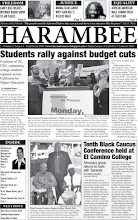Items off the table
By Mumia Abu Jamal
SPECIAL TO HARAMBEE
As the national political conventions fade into the fog of our short-term memory, few items seem to have penetrated the made-for-TV presentations.
We remember a few snippets (if we're lucky), a few disparate images, an emotional impression, perhaps.
I'm willing to bet that few of us remember any meaningful discussion of the real economic problems faced by the U.S. That's because none of the major presidential candidates have even the remotest solutions to the economic problems plaguing the country, for both are ardent advocates of globalization -- and globalization ain't the solution -- it's the problem.
For globalization emerged as a tool of U.S. economic power to dominate the world in the post-Cold War era. It was designed to open up foreign markets to U.S. and Western businesses, using the illusion of "free trade" to crowbar into local and national economies.
Chalmers Johnson, in his 2000 book, Blowback: The Costs and Consequences of Empire (N.Y.: Owl Books) puts forth precisely this thesis with clarity and conviction. He illustrates how much of this could be traced to former president Richard Nixon's abolition of the post-World War Bretton Woods agreements, which pegged world currencies to the dollar, and the dollar to U.S. gold reserves. From that day on, economies became free floating, and whole new industry was born -- finance capital, or the business of speculating in, and profiting from, the moneys of others. Such a system, especially when wedded with the protectionism that prevailed in East Asia for some 50 years, created havoc around the world, where foreign wealth destabilizes local markets, for the quick buck.
A byproduct of this new globalized economy was the hollowing out of American industries, the loss of manufacturing jobs, and the failure of America's domestic economy.
Johnson cites the work of City College of New York historian, Judith Stein, for examples of how U.S. industrial policy became a wrecking ball to Black communities both in the South and North, industries abroad was a keystone of U.S. strategic policy, and encouraging steel imports became a tool for maintaining vital alliances. The nation's leaders by and large ignored the resulting conflict between Cold War and domestic goals" { p.195}.
While presidential candidates argue over taxes on capital gains, millions of Americans struggle to make ends meet. Tens of thousands of people have lost their homes, due to lost jobs or foreclosures.
It is a globalized economy for capital, high finance, and speculation, but it can hardly be considered one for working people. For them, a hundred barriers bloom, making it harder than ever to chase jobs.
Both major candidates are deaf to their plight, and thus are ill-disposed to address it, much less solve it.
(Column written September 4, 2008, Mumia Abu Jamal)












No comments:
Post a Comment